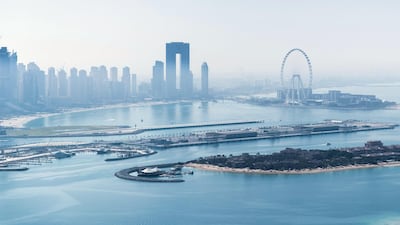Dubai’s success in handling the Covid-19 pandemic and its proactive policy measures to jump-start the economy have driven demand for property, pushing capital values for prime homes higher in the emirate.
Residential capital values grew 4.2 per cent in the first half of 2021 on availability of good quality stock, affordable prices and strong transaction activity, according to a report by global property consultancy Savills.
“The return of international travel is likely to provide an increased supply of buyers for prime properties,” said Swapnil Pillai, associate director of research at Savills Middle East.
“The economic recovery and growth, led by [an] increasing vaccination rate in the UAE, is expected to further support buyer confidence and boost demand. Though a degree of pandemic-related uncertainty remains, the prime residential sector is likely to remain strong through the rest of the year.”
Despite the ongoing uncertainty caused by the pandemic, 30 property markets in the Savills global index held up well as capital values grew on average by 3.9 per cent over the six-month period, the fastest growth rate since December 2016, according to the consultancy.
Dubai, the commercial and travel centre of the Middle East, was ranked 11th in terms of capital appreciation, with Shanghai topping the charts, followed by another Chinese city, Hangzhou. The US cities of Los Angeles and Miami occupied third and fourth spots, respectively.
Moscow, Seoul and Lisbon were also included in the top-10 global markets that have registered considerable capital appreciation in the first half, according to the report.
“With offices closed and the work-from-home concept in full bloom, the resulting increased need for space helped to push up capital values in locations including Dubai, Cape Town, Moscow and Lisbon,” Savills said.
“Alongside that, transaction volumes are going up in comparison with the first half of 2020 when a lot of cities where in complete lockdown.”
The UAE property market – which softened due to a three-year oil price slump that began in 2014, oversupply concerns and the pandemic – is bouncing back strongly.
People upgrading to larger homes with outdoor amenities have driven demand amid a rise in remote working and learning.
Economic support measures and government initiatives – such as residency permits for retirees and remote workers and the expansion of the 10-year golden visa programme – have also helped to improve investor sentiment.
Dubai’s prime residential market recorded a 43.8 per cent surge in sales volume in the second quarter of 2021, compared with the previous quarter, according to Luxhabitat Sotheby’s International Realty report, which cited Dubai Land Department data.
Total sales during the period included 4,681 apartments and 818 villas valued at Dh16.7 billion ($4.54bn).
Overall property prices in Dubai rose 15 per cent in July alone, with average price in the emirate climbing to Dh941 per square foot ($256), from Dh818 per square foot in the same period last year, Property Monitor said.
Prices rose 1.9 per cent month-on-month in July and have climbed 11.8 per cent this year, mirroring the global trend as the world recovers from the pandemic-driven slowdown, according to its monthly market report.


